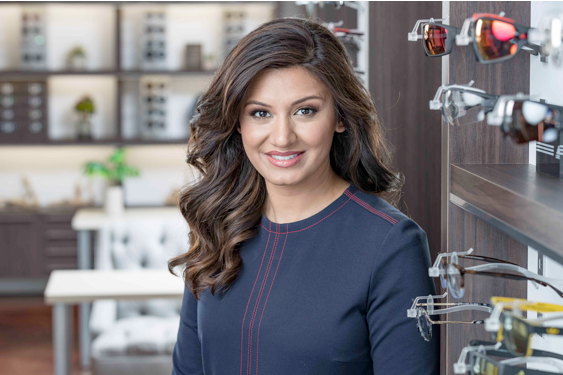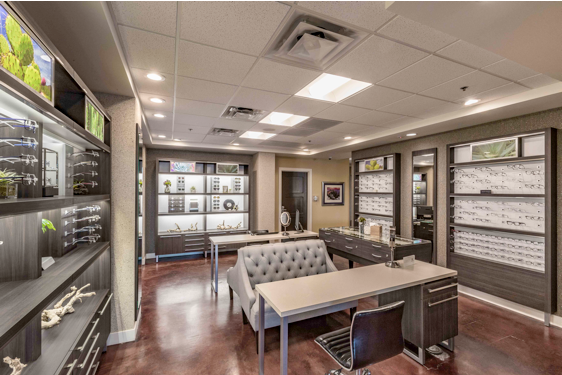
In honor of Healthy Vision Month, AZ Foothills turned to Dr. Zahra Lalwani Lasee of Healthy Eye Care/Fit Optical to get the lowdown on everyday eye health, when it's time to get your kiddo's eyes checked and what the deal is with those blue light-blocking lenses.

Dr. Lasee
What inspired you to pursue optometry?
ZL: There are some things in life you just do because of an internal drive controlled by a force beyond the scope of one’s own understanding. I was an auditor working in a detail-oriented profession, which seemed to suit my personality but found myself internally dissatisfied. I needed to heal people somehow and now looking back, I received way too many sings from the universe that I had to heal eyes. Knowing I disliked surgery, went for optometry. I just think it’s so awesome to have a profession that is already organ specific without having to go through medical school, so I didn’t even apply to medical school. Like a bullet train, I look the classes needed for optometry school and kept tunnel vision until I perused the goal. I have never ever looked back. I was born to do this.
What is the most rewarding part of your career?
ZL: Hands down, has to be keratoconus treatment and management. This is an unfortunate disease, that without proper care, can leave someone practically blind and economically enviable. It's insanely satisfying to give someone their life back with specialty contact lenses, and I wake up excited to do it every day. I even placed my practice in a location so that people with the disease can take the bus from any of the cities around Phoenix and reach my practice. I strategically found a place where the bus stops in front of the business for the keratoconus patients.
How important is it to incorporate eye health into one’s wellness routine?
ZL: What has not been explained to many people is that vision is responsible for majority of brain development from birth to age 3; thereafter one's performance in school is in many ways directly correlated to the ease of vision. Furthermore, an eye doctor can tell you weather or not you have a disease sometimes years before it shows up in blood work, and we play a key role in preventative medicine. Contact lenses must be evaluated annually by a doctor to make sure that it is not robbing a very delicate tissue of key nutrients. Also, yes, everyone should be wearing the latest and greatest contact lens, always. If you have not had a new contact recommended for several years, it is time to seek new council, this is not the place to try and save money.
What are everyday measures one can take to aid eye health?
ZL: Believe it or not, nix the over-the-counter eye vitamins. This has very much turned into a marketing gimmick. Eye vitamins should be distributed accordingly and directly through your eye doctor. Also, do not take over-the-counter red eye reducers on a daily basis. What you can do is load up on raw nutrients, green vegetables and omega 3 fatty acids; great for the eyes, blood vessels and brain tissue.

How often should one see the eye doctor?
ZL: Annually at the very least.
When should children start seeing an eye doctor?
ZL: The new standard of care indicates at 6 months of age, and every year thereafter.
Blue light-blocking glasses seem to be growing in popularity. What is your opinion on those?
ZL: Blue light blockers are extremely necessary for all individuals. Think of it this way: the sky is blue because it is blocking out harmful blue light. Then humans made devices that put that same blue light into our environment and directly into our delicate eyes! Studies show that this light causes oxidative stress to our retinal tissues, and they need to be blocked ASAP. Again, however, we must be mindful of gimmicky products and not purchase yellow glasses with the assumption that they can block out the correct wavelengths of harmful blue light. Private eye doctors keep the best products for this that have been clinically tested to block out the correct wavelengths of blue light and we can place them directly in your glasses. Also, children need protective blue light blockers more than we do, as studies show that 80 percent of light-related eye damage occurs before the age of 18.
Sunglasses are often chosen for fashion purposes—but how can one be sure they are choosing protective lenses?
ZL: That’s an excellent question. The best lenses are found at private doctor-owned clinics. We stand behind our license and tend to be picky about products we distribute. We are usually not entirely focused on profit margin, and we know that our reputations are set by high standards, so we can give you clinical studies of the products we sell, proving their excellence. Do not be fooled by anything that says “same as” or “compare to.” In most cases, nothing is comparable because all awesome optical products have patents.